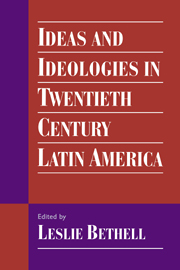2 - Political ideas and ideologies in Latin America, 1870–1930
Published online by Cambridge University Press: 05 June 2012
Summary
Political ideas in Latin America have been affected by two obvious though frequently unappreciated facts that distinguish the region from other parts of the ‘non-Western’, ‘developing’, or ‘third’ world with which it has often been compared. First, the culture of Latin America's governing and intellectual elites is integrally Western, that is, it has emerged within the broader confines of Western European culture, modified of course by the special characteristics Spain and Portugal imparted to their former colonies. Second, the nations of Latin America, with the exception of Cuba, gained their political independence at the beginning of the nineteenth century.
It is now common to refer to nineteenth-century Latin America as ‘neocolonial’, which suggests a situation of economic and cultural dependence for nations that were politically independent. The implication is that independence was formal and superficial and that dependence was the deeper and more significant experience of the region. It is clear that the elites of nineteenth-century Latin America were tied to, even dependent on, Europe, and that their economic interests within the international capitalist system formed part of that tie. It is also clear that the bond with Europe was strengthened after 1870, with the burgeoning of the Latin American export economies. Less clear is that the circumstance of early political independence can be regarded as a superficial element in Latin American culture. On the contrary, the ideologies, political programmes and social theories of the nineteenth century, while intellectually ‘European’, were nonetheless distinctive and authentically ‘Latin American’, in part because they emerged in politically independent nations.
- Type
- Chapter
- Information
- Ideas and Ideologies in Twentieth-Century Latin America , pp. 133 - 206Publisher: Cambridge University PressPrint publication year: 1996
- 32
- Cited by



